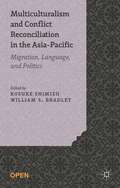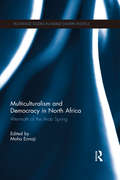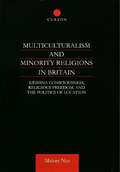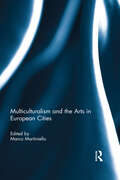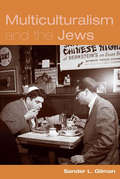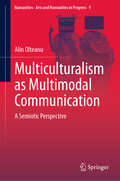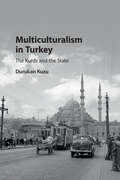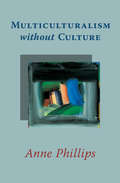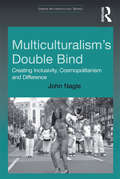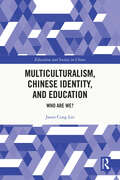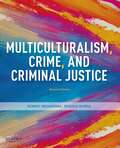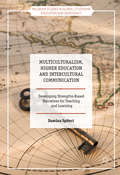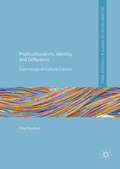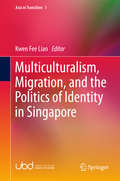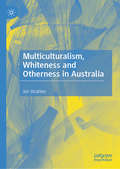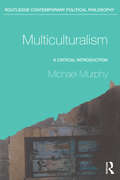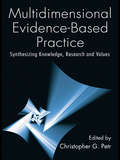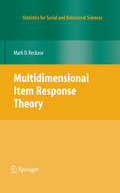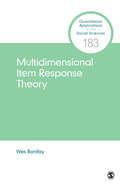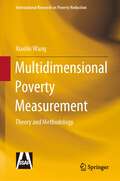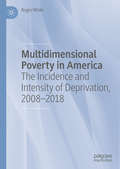- Table View
- List View
Multiculturalism Within a Bilingual Framework
by Eve HaqueFrom the time of its inception in Canada, multiculturalism has generated varied reactions, none more starkly than between French and English Canadians. In this groundbreaking new work, Eve Haque examines the Government of Canada's attempt to forge a national policy of unity based on 'multiculturalism within a bilingual framework,' a formulation that emerged out of the Royal Commission on Bilingualism and Biculturalism (1963-70). Uncovering how the policies of bilingualism and multiculturalism are inextricably linked, Haque investigates the ways in which they operate together as part of our contemporary national narrative to favour the language and culture of Canada's two 'founding nations' at the expense of other groups. Haque uses previously overlooked archival material, including transcripts of royal commission hearings, memos, and reports, to reveal the conflicts underlying the emergence of this ostensibly seamless policy. By integrating two important areas of scholarly concern - the evolution and articulation of language rights in Canada, and the history of multiculturalism in the country - Haque provides powerful insight into ongoing asymmetries between Canada's various cultural and linguistic groups.
Multiculturalism and Conflict Reconciliation in the Asia-Pacific: Migration, Language And Politics
by Kosuke Shimizu William S. BradleyMulticulturalism and Conflict Reconciliation in the Asia-Pacific: Migration, Language and Politics
Multiculturalism and Democracy in North Africa: Aftermath of the Arab Spring (Routledge Studies in Middle Eastern Politics)
by Moha EnnajiInvestigating the connections between multiculturalism, minorities, citizenship, and democracy in North Africa, this book argues that multiculturalism in this region– and in the Arab world at large – has reached a significant level in terms of scale and importance. In the rest of the world, there has been a trend – albeit a contested one – toward a greater recognition of minority rights. The Arab world however, particularly North Africa, seems to be an exception to this trend, as Arab states continue to promote highly unitary and homogenizing ideas of nationhood and state unity, whilst discouraging, or even forbidding, minority political mobilization. The central theoretical premise of this book is that North Africa is a multicultural region, where culture is inherently linked to politics, religion, gender, and society, and a place where democracy is gradually taking root despite many political and economic hurdles. Addressing the lacuna in literature on this issue, this book opens new avenues of thought and research on diversity, linking policy based on cultural difference to democratic culture and to social justice. Multiculturalism and Democracy in North Africa will be of use to students and researchers with an interest in Sociology, Cultural Studies, and Political Science more broadly.
Multiculturalism and Minority Religions in Britain: Krishna Consciousness, Religious Freedom and the Politics of Location (Curzon Studies In New Religious Movements Ser.)
by Malory NyeA detailed case study of the International Society for Krishna Consciousness (ISKCON) in Britain. The book studies the particular development of a new religious movement within the context of Britain, and issues relating to minority religions' place within a multicultural but still hegemonically Christian society.
Multiculturalism and the Arts in European Cities
by Marco MartinielloThis book discusses the tension, or even the contradiction, between ethno-cultural segregation and ethno-cultural mixing in the field of the arts. It focuses on the local artistic sphere in the multicultural EU cities of Amsterdam, Antwerp, Brussels, Cologne, Malmö and Vienna. The chapters show a variety of local experiences by exploring in each city discourses, policies and practices in the local artistic field and by addressing one or more of the following questions: How do cities construct diversity discourses and policies? How do migrants and subsequent generations mobilise in the local artistic scene? What type of collective identities and ethnicities are publicly expressed and constructed in the arts? Are immigrant and ethnic artists and productions supported by official cultural institutions? Are local cultural policies becoming multicultural? How do migrant and ethnic artist mobilise in order to change cultural policies? The contributors combine top-down and bottom-up perspectives from a variety of large, mid-size and small European cities to make sense of the links between migrants and ethnic groups and artistic change at the local level. They examine how the city as an artistic space is changed by minority artistic expression and also how local cultural institutions change minority artistic expressions. The chapter authors are drawn from broad variety of disciplines, including anthropology, cultural studies, political science, sociology, urban studies and planning, offering the reader a broad variety of perspectives and insights into this area. This book was originally published as a special issue of Identities: Global Studies in Culture and Power.
Multiculturalism and the Jews
by Sander GilmanIn this powerful and wide-ranging study, Sander Gilman explores the idea of 'the multicultural' in the contemporary world, a question he frames as the question of the relationship between Jews and Muslims. How do Jews define themselves, and how are they in turn defined, within the global struggles of the moment, struggles that turn in large part around a secularized Christian perspective? Gilman uses his subject to unpack a sequence of important issues: what does it mean to be multicultural? Can the experience of diaspora Judaism serve as a useful model for Islam in today's multicultural Europe? What is a multicultural ethnic? Other chapters look at specific figures in Jewish cultural history – Albert Einstein, Franz Kafka, Israel Zangwill, Philip Roth, the hermaphrodite N.O. Body (aka Karl Baer, raised as Martha Baer) – to explore issues within Jewish identity. Throughout, Gilman pays keen attention to the ways in which contemporary literature – Chabon, Ozick, Zadie Smith, Jonathan Safran Foer, Gary Shteyngart – taking the idea of Jewishness and multiculturalism into new arenas.
Multiculturalism as Multimodal Communication: A Semiotic Perspective (Numanities - Arts and Humanities in Progress #9)
by Alin OlteanuThis highly readable book develops a numanistic, and specifically semiotic approach to multiculturalism. It reveals how semiotics provides fresh and valuable insights into multiculturalism: in contrast to the binary logic of dualistic philosophy, semiotic logic does not understand the value of truth in rigid terms of ‘true’ or ‘false’, ‘right’ or ‘wrong’ only. The value of truth resides in meaning, which is a dynamic, evolutionary phenomenon, rooted, nevertheless, in factuality.Drawing on recent developments in biosemiotics, the book presents a theoretical approach to multiculturalism, regarding the lives of people living in multicultural environments. Rather than analyzing political or economic phenomena, it offers a semiotic analysis of multiculturalism and discusses its educational implications. It also invites readers to regard learning as a phenomenon of ecological sign growth and to understand multiculturalism along the same lines. As such, it brings together the life and social sciences and the humanities in a unified perspective, in an approach fitting postmodernism.Developing a postmodern philosophy for contemporary non-experts, which allows distancing from political discourse in favor of a posthumanistic stand, where altruism is seen as an opportunity, not a threat, this book appeals to a wide readership, from scholars seeking state-of-the-art theories to general readers looking for a thought-provoking and enlightening read.
Multiculturalism in Turkey: The Kurds and the State
by Durukan KuzuOver the past couple of decades, there have been many efforts to seek a solution to the often violent situation in which Kurdish citizens of Turkey find themselves. These efforts have included a gradual programme of political recognition and multiculturalism. Here, Durukan Kuzu examines the case of Kurdish citizens in Turkey through the lens of the global debate on multiculturalism, exploring the limitations of these policies. He thereby challenges the conventional thinking about national minorities and their autonomy, and offers a scientifically grounded comparative framework for the study of multiculturalism. Through comparison of the situation of Kurds in Turkey with that of other national minorities - such as the Flemish in Belgium, Québécois in Canada, Corsicans in France, and Muslims in Greece - the reader is invited to question in what forms multiculturalism can work for different national minorities. A bottom-up approach is used to offer a fresh insight into the Kurdish community and to highlight conflicting views about which form the politics of recognition could take. Approaches multiculturalism in Turkey in an original light, going beyond existing approaches to offer a new critical perspective; Bridges the gap between political theory and social science in the context of self-government and national minorities; Addresses the political accommodation of the Kurds in Turkey.
Multiculturalism without Culture
by Anne PhillipsPublic opinion in recent years has soured on multiculturalism, due in large part to fears of radical Islam. In Multiculturalism without Culture, Anne Phillips contends that critics misrepresent culture as the explanation of everything individuals from minority and non-Western groups do. She puts forward a defense of multiculturalism that dispenses with notions of culture, instead placing individuals themselves at its core. Multiculturalism has been blamed for encouraging the oppression of women--forced marriages, female genital cutting, school girls wearing the hijab. Many critics opportunistically deploy gender equality to justify the retreat from multiculturalism, hijacking the equality agenda to perpetuate cultural stereotypes. Phillips informs her argument with the feminist insistence on recognizing women as agents, and defends her position using an unusually broad range of literature, including political theory, philosophy, feminist theory, law, and anthropology. She argues that critics and proponents alike exaggerate the unity, distinctness, and intractability of cultures, thereby encouraging a perception of men and women as dupes constrained by cultural dictates. Opponents of multiculturalism may think the argument against accommodating cultural difference is over and won, but they are wrong. Phillips believes multiculturalism still has an important role to play in achieving greater social equality. In this book, she offers a new way of addressing dilemmas of justice and equality in multiethnic, multicultural societies, intervening at this critical moment when so many Western countries are poised to abandon multiculturalism.
Multiculturalism's Double-Bind: Creating Inclusivity, Cosmopolitanism and Difference (Urban Anthropology)
by John NagleUsing a rich array of ethnographic and archival data closely considering the Irish and the manner in which ’Irishness’ was rendered inclusive, Multiculturalism's Double Bind demonstrates that multiculturalism can encourage cross-community political engagement in the global city. This book challenges the perceived wisdom that multiculturalism counteracts the opportunity for groups to move beyond their particularized constituency to build links and networks with other 'minority' groups. Theoretically informed and empirically grounded this volume will appeal to scholars across a range of disciplines, including migration and ethnicity, social and cultural anthropology, Irish studies and sociology.
Multiculturalism, Chinese Identity, and Education: Who Are We? (Education and Society in China)
by Jason Cong LinIn Chinese societies, Chinese identity is an important yet controversial topic. This book examines official understandings of Chinese identity in Mainland China and Hong Kong, exploring how the latest governments of Mainland China and Hong Kong conceptualize Chinese identity; how government-endorsed textbooks frame it in different subjects; and how a multicultural approach can enhance understanding of identity in both societies. Using content analysis to support his theoretical arguments, Lin offers an in-depth, updated, and detailed picture of how the governments of Mainland China and Hong Kong, and their endorsed textbooks, encourage people in these societies to respond to the question of "who are we?". He also elaborates on how the current approach to understanding Chinese identity can be harmful, and examines how a multicultural approach could better fit these Chinese contexts and enhance understanding of "who are we?". Given that the question of identity causes trouble everywhere, and many countries are debating approaches to understanding diverse identities in their own societies, this book provides valuable insights into the Chinese perspective, to allow readers to more fully understand global frameworks of identity. This book will interest researchers and students in the fields of multiculturalism, multicultural education, national identity, identity politics, and China and Hong Kong studies.
Multiculturalism, Crime, And Criminal Justice
by Robert McNamara Ronald BurnsMulticulturalism, Crime, and Criminal Justice, Second Edition, provides an overview of the problems and promises of cultural diversity in society and within all facets of the criminal justice system. It focuses on how different marginalized groups--African Americans, Hispanic Americans, Asian Americans, Native Americans, women, the LGBTQ community, the elderly, and juveniles--are impacted by law enforcement, the courts, and correctional agencies, addressing the issues that each group faces. It also examines how multiculturalism affects those who work within the criminal justice system, including members of minority groups.
Multiculturalism, Crime, and Criminal Justice
by Robert McNamara Ronald BurnsMulticulturalism, Crime, and Criminal Justice provides an overview of the problems and promises of cultural diversity in society and within all facets of the criminal justice system. It focuses on how different marginalized groups—African Americans, Hispanic Americans, Asian Americans, Native Americans, women, the LGBTQ community, the elderly, and juveniles—are impacted by law enforcement, the courts, and correctional agencies, addressing the issues that each group faces. It also examines how multiculturalism affects those who work within the criminal justice system, including members
Multiculturalism, Higher Education and Intercultural Communication
by Damian SpiteriThis book explores how multiculturalism should be promoted throughout higher education due to its benefits for students. It adopts a strengths-based student-centred perspective and offers practical illustrations of how multicultural education can instigate students to understand each other and to relate to each other meaningfully. With the rise of international students in higher education across the globe it is crucial that institutions promote multicultural education for their wider communities.
Multiculturalism, Higher Education and Intercultural Communication: Developing Strengths-Based Narratives for Teaching and Learning (Palgrave Studies in Global Citizenship Education and Democracy)
by Damian SpiteriThis book explores how multiculturalism should be promoted throughout higher education due to its benefits for students. It adopts a strengths-based student-centred perspective and offers practical illustrations of how multicultural education can instigate students to understand each other and to relate to each other meaningfully. With the rise of international students in higher education across the globe it is crucial that institutions promote multicultural education for their wider communities.
Multiculturalism, Identity and Difference
by Elke MurdockMulticultural societies are a phenomenon that can be increasingly observed worldwide. This book focuses on the question of how individuals living within a multicultural society experience the meeting of cultures. Murdock combines both a thorough review of the theoretical body of research concerning multiculturalism and related concepts such as globalization, acculturation and biculturalism with specific empirical research evidence, providing new insights into factors which shape our openness towards a plurally composed society. Multiculturalism, Identity and Difference contains original research conducted within the 'natural laboratory' that multilingual, multicultural Luxembourg provides. This is a country where the foreign population makes up nearly half of the total population. In the era of globalization, culture contact is a daily occurrence and this book makes a contribution to the questions of if and how culture contact can be experienced as an opportunity rather than a threat by individuals.
Multiculturalism, Migration, and the Politics of Identity in Singapore
by Kwen Fee LianThis edited volume focuses on how multiculturalism, as statecraft, has had both intended and unintended consequences on Singapore's various ethnic communities. The contributing authors address and update contemporary issues and developments in the practice of multiculturalism in Singapore by interfacing the practice of multiculturalism over two critical periods, the colonial and the global. The coverage of the first period examines the colonial origins and conception of multiculturalism and the post-colonial application of multiculturalism as a project of the nation and its consequences for the Tamil Muslim, Ceylon-Tamil, and Malay communities. The content on the second period addresses immigration in the context of globalization with the arrival of new immigrants from South and East Asia, who pose a challenge to the concept and practice of multiculturalism in Singapore. For both periods, the contributors examine how the old migrants have attempted to come to terms with living in a multicultural society that has been constructed in the image of the state, and how the new migrants will reshape that society in the course of their ongoing politics of identity.
Multiculturalism, Whiteness and Otherness in Australia
by Jon StrattonThis book examines the experience of race and ethnicity in Australia after the withering away of official multiculturalism. The first chapter looks at the formation of the Australian state, the role that multiculturalism has played, and the impact of neoliberal ideas. The second chapter takes nightclubbing in the city of Perth during the 1980s, the peak period for official multiculturalism, to exemplify how diversity and exclusion functioned in everyday life. The third chapter considers the imbrication of Christianity in the Australian socio-cultural order and its impact on the limits of multiculturalism with particular concentration on Islam and the Australian Muslim experience. Subsequent chapters discuss the exclusionary experience of various groups identified as non-white through the lens of films, popular music and television programs.
Multiculturalism: A Critical Introduction (Routledge Contemporary Political Philosophy)
by Michael MurphyWhat is multiculturalism and what are the different theories used to justify it? Are multicultural policies a threat to liberty and equality? Can liberal democracies accommodate minority groups without sacrificing peace and stability? In this clear introduction to the subject, Michael Murphy explores these questions and critically assesses multiculturalism from the standpoint of political philosophy and political practice. The book explores the origins and contemporary usage of the concept of multiculturalism in the context of debates about citizenship, egalitarian justice and conflicts between individual and collective rights. The ideas of some of the most influential champions and critics of multiculturalism, including Will Kymlicka, Chandran Kukathas, Susan Okin and Brian Barry, are also clearly explained and evaluated. Key themes include the tension between multiculturalism and gender equality, cultural relativism and the limits of liberal toleration, and the impact of multicultural policies on social cohesion ethnic conflict. Murphy also surveys the legal practices and policies enacted to accommodate multiculturalism, drawing on examples from the Americas, Australasia, Europe, Asia and the Middle East. Multiculturalism: A Critical Introduction is an ideal starting point for anyone coming to the topic for the first time as well as those already familiar with some of the key issues.
Multidimensional Evidence-Based Practice: Synthesizing Knowledge, Research, and Values
by Christopher G. PetrMultidimensional Evidence-Based Practice (MEBP) is a new and comprehensive approach to determining best practices in social services. MEBP improves upon traditional evidence-based approaches by incorporating the views of consumers and professionals, qualitative research and values. The book begins with a review of the context of best practice enquiry and goes on to present the seven steps of the MEBP model, discussing each step in detail. The model is appraised and explains how questions are formed, how various forms of knowledge and evidence are summarized and evaluated, and how values are used to both critique current best practices and point towards needed improvements. The final seven chapters illustrate the MEBP process at work specific to a range of topics including best practices in the prevention of child abuse and best practices in restorative justice. This book will be of interest to social workers and other professionals involved in the delivery of human services. It is also suitable for students and researchers of evidence-based practice.
Multidimensional Item Response Theory
by M. D. ReckaseFirst thorough treatment of multidimensional item response theory Description of methods is supported by numerous practical examples Describes procedures for multidimensional computerized adaptive testing
Multidimensional Item Response Theory (Quantitative Applications in the Social Sciences #183)
by Wes BonifaySeveral decades of psychometric research have led to the development of sophisticated models for multidimensional test data, and in recent years, multidimensional item response theory (MIRT) has become a burgeoning topic in psychological and educational measurement. Considered a cutting-edge statistical technique, the methodology underlying MIRT can be complex, and therefore doesn’t receive much attention in introductory IRT courses. However author Wes Bonifay shows how MIRT can be understood and applied by anyone with a firm grounding in unidimensional IRT modeling. His volume includes practical examples and illustrations, along with numerous figures and diagrams. Multidimensional Item Response Theory includes snippets of R code interspersed throughout the text (with the complete R code included on an accompanying website) to guide readers in exploring MIRT models, estimating the model parameters, generating plots, and implementing the various procedures and applications discussed throughout the book.
Multidimensional Item Response Theory (Quantitative Applications in the Social Sciences #183)
by Wes BonifaySeveral decades of psychometric research have led to the development of sophisticated models for multidimensional test data, and in recent years, multidimensional item response theory (MIRT) has become a burgeoning topic in psychological and educational measurement. Considered a cutting-edge statistical technique, the methodology underlying MIRT can be complex, and therefore doesn’t receive much attention in introductory IRT courses. However author Wes Bonifay shows how MIRT can be understood and applied by anyone with a firm grounding in unidimensional IRT modeling. His volume includes practical examples and illustrations, along with numerous figures and diagrams. Multidimensional Item Response Theory includes snippets of R code interspersed throughout the text (with the complete R code included on an accompanying website) to guide readers in exploring MIRT models, estimating the model parameters, generating plots, and implementing the various procedures and applications discussed throughout the book.
Multidimensional Poverty Measurement: Theory and Methodology (International Research on Poverty Reduction)
by Xiaolin WangThis book addresses and compensates for the lack of poverty measurement research in China. With regard to the multi-dimensional measurement of poverty, it is clear that the situation of Chinese farmers is problematic in terms of five major aspects: sanitation facilities, health insurance, durable consumer goods, productive assets and modern fuels. Based on these criteria, the book provides a clear direction for policy intervention to comprehensively improve farmers’ standard of living and tackle the key problems of poverty alleviation and development in the region. In addition, its analysis of poverty among ethnic minorities, the elderly and children offers valuable reference material for poverty alleviation and the development of special groups.
Multidimensional Poverty in America: The Incidence and Intensity of Deprivation, 2008-2018
by Roger WhiteThis book investigates and documents multidimensional poverty in the United States and identifies patterns and relationships that contribute to the development of a more complete understanding of the incidence and intensity of deprivation. The first part introduces multidimensional poverty and provides a rationale for viewing poverty through a lens of multiple deprivations. It discusses how the Multidimensional Poverty Index (MPI) compares to more narrowly-focused, income-based poverty measures and emphasizes its usefulness and applicability for the formulation of related, welfare-enhancing public policies. The second part documents multidimensional poverty incidence, intensity, and corresponding MPI values at the aggregate level of detail, for various demographic cohorts, and across geographic locales. The book then presents results from an empirical analysis that identifies the determinants of multidimensional poverty incidence and of individual deprivation scores. The third part consists of three studies of multidimensional poverty, examining the effect of the Affordable Care Act on multidimensional poverty incidence and intensity, variation in multidimensional poverty across native- and foreign-born residents (and across immigrants’ home countries) of the US, and variation in the respective indicators that contribute to multidimensional poverty across the life cycle. The book closes with two chapters. The first relays the findings of counterfactual exercises where certain deprivations are assumed to have been eliminated. The final chapter summarizes the work, draws inferences and arrives at conclusions, and discusses the corresponding public policy implications.

